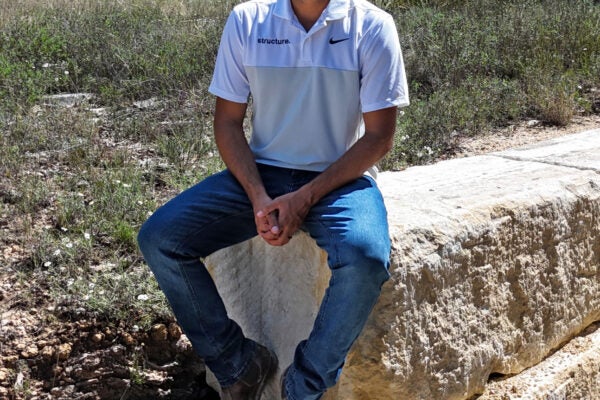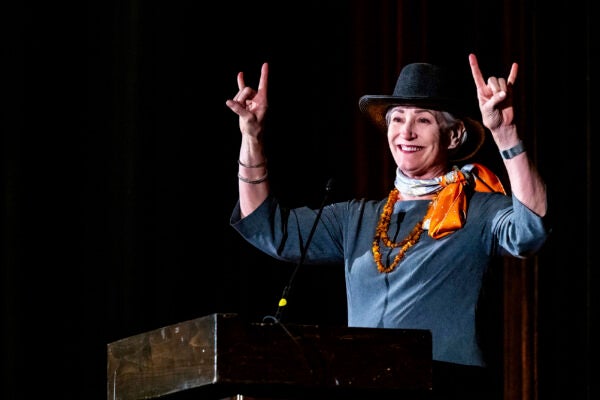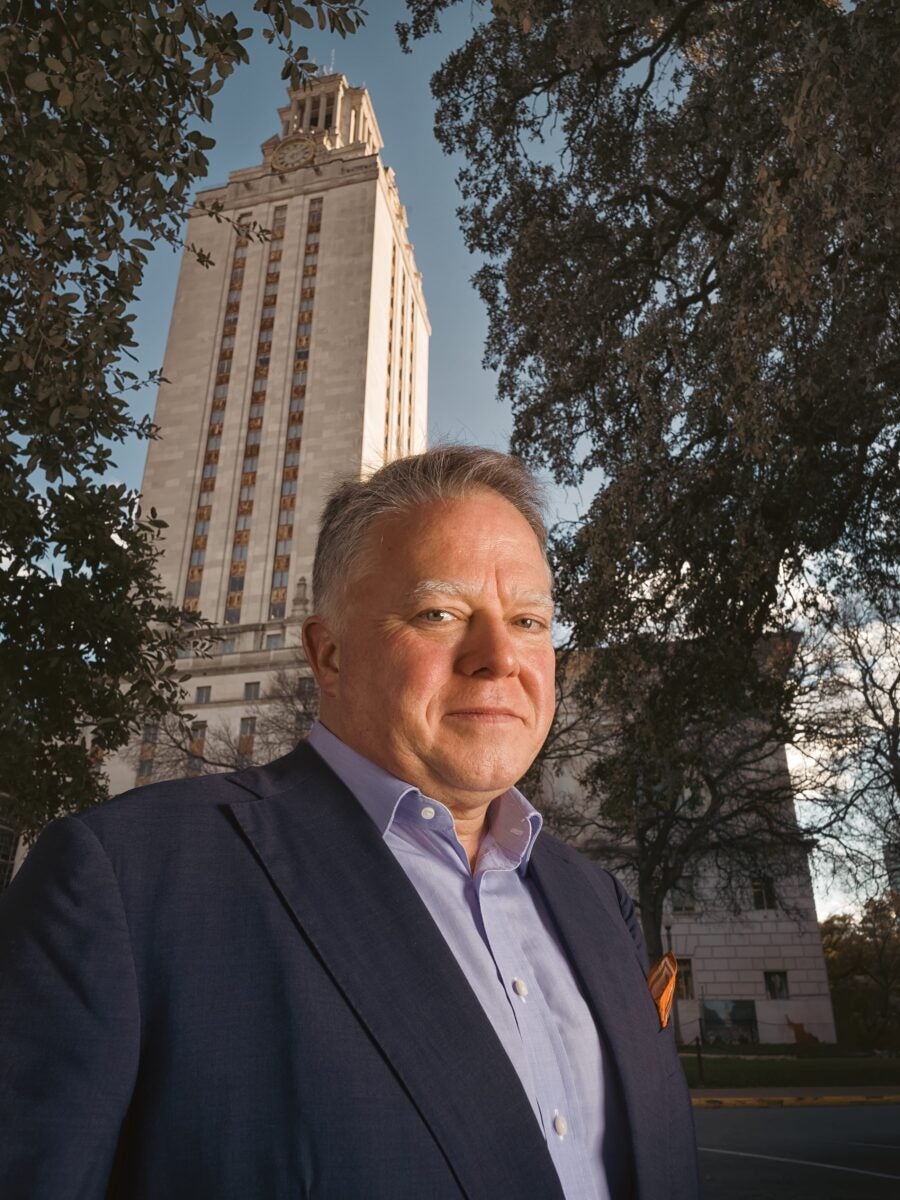
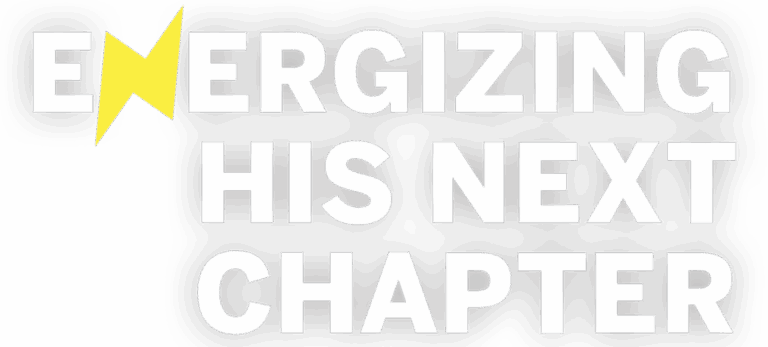
Chris Bake, BBA ’88, enjoyed a high-voltage career and now helps future energy leaders get a global perspective
by Omar L. Gallaga
photo by Brian Goldman
On an early spring day, industry visionary Chris Bake, BBA ’88, stood on UT’s South Lawn in a blue business suit, sans tie, soaking up the scene. It’s a campus view that hasn’t changed much since he was a student decades ago, though these days, students lounge in shorts and tees, listening to tunes from Bluetooth speakers and propping open tablets. Closer to the Tower behind him, a group of students practices making human pyramids, stacking legs and arms that reach for the sky.
Bake flew back to Austin from his home in London, where his family has lived for the past 12 years, for a dual purpose. He and his wife, Cynthia, were touring the Forty Acres as a possible college option for their younger son, while Bake also met with McCombs leaders on a new project that he expects to headline his life’s next chapter.
After all, his transformation began here.
Since his student days, when Bake forged a career path, he has soared as a global energy expert. Bake has accumulated deep knowledge of the world’s evolving power needs and what it takes to be successful in business. An innovator by nature, he sees a creative way to educate a new generation of energy leaders. They need to know not only how the business works but also how to collaborate and understand different cultures and mindsets to achieve results, Bake says.
To that end, he helped fund the Global Sustainability Leadership Institute in 2020. It’s a joint project of the McCombs School of Business and the Moody College of Communication that arms students with the multidisciplinary skills Bake says they will need in their careers.
His gift came with a commitment to stay involved with the University that energized him decades ago and molded his future. “I came back here to really just have a refresh on what GSLI is doing and how I could help bring it to the next stage,” Bake says.
On Oct. 31, Bake ended a 30-year run as an executive at the international energy and commodities company Vitol and has spent the past year transitioning from being its managing director to directing his energy into GSLI, other interests, and his family.
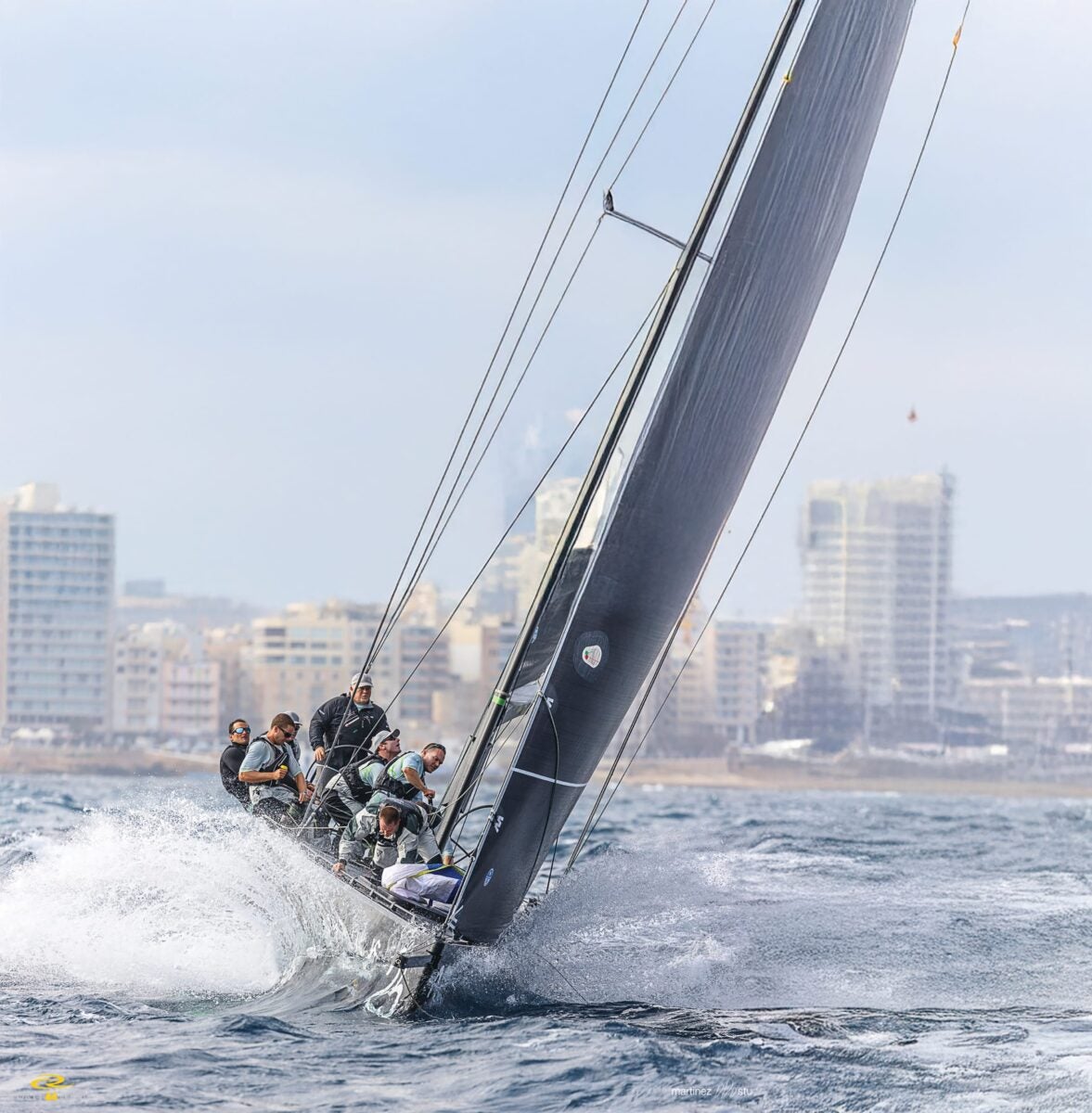
“After 30 years, an incredible set of experiences, I thought it was time to take stock and think about doing something else and not necessarily a new career, per se. It was a little bit nostalgic, looking back, but also exciting because it marked the beginning of a new chapter.”
— Chris Bake
Focusing his attention on renewable energy and sustainability may seem like a big shift from the oil and gas sector where Bake spent his career, but it’s not a stretch, considering who he is or how his work and thinking have evolved. Bake has been a world traveler and explorer all his life.
Born in Thailand to parents from New Zealand and the Netherlands, Bake was raised in Spain and educated in England and the United States. He and his family relocated often as his father worked as a developer of sports harbors and marinas. As an adult, Bake has lived in such places as Dubai, Bahrain, Houston, and Buenos Aires, Argentina. That international business pedigree stoked an interest in finding solutions to finite resources, and it allowed him to indulge his passion for competitive sailing.
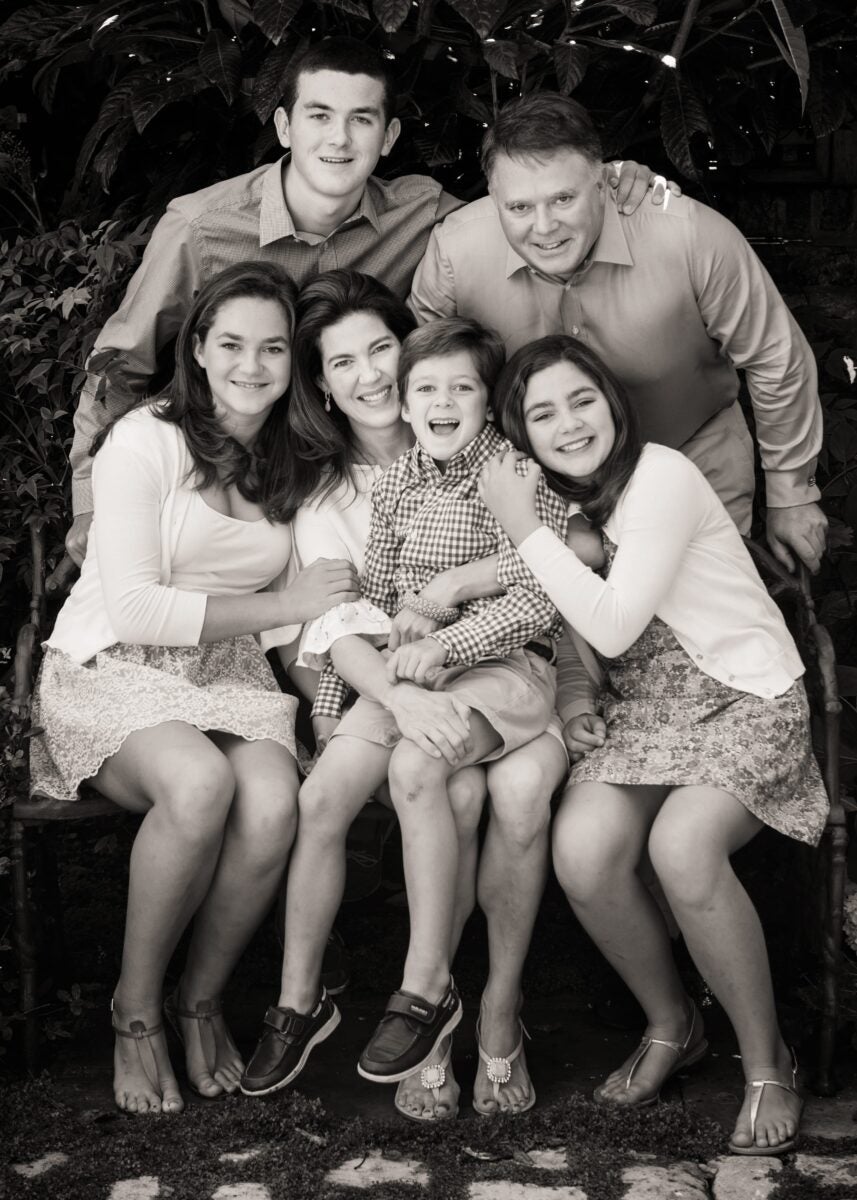
As he told the “McCombs Made” podcast in February, that type of sailing requires pushing yourself — and collaborating. “Most of the sailing sport is a team sport, (a) dynamic about being able to not only extract the best from yourself but those around you, to figure out how to make a boat move through the water efficiently and how to read the wind and the waves and the current. … That is really exciting, and every day is different.”
As his son explores UT during the visit, Bake is doing the offhand parenting thing of trying not to oversell an idea for which he is clearly advocating. He hopes his son will fall in love with UT as he did when he arrived in 1983.
That philosophy also served him well in business.
After he graduated, Bake worked at traditional energy companies but says he was drawn to Vitol in the mid-1990s because of its interest in “circularity.” As he explains, it’s about replacing the “take-make-dispose” linear model of energy with “a more circular approach that looks to reduce waste and promote reusable systems and processes.”
Over the years at Vitol, he relocated his family multiple times as he expanded the company’s reach with new offices across the world. Besides English, Bake is fluent in Spanish and French and speaks a bit of several other languages.
Bake excelled at navigating challenging environments, such as doing business in the Middle East and bringing people and governments to the table to negotiate and trade. That required not only good salesmanship but also a deep understanding of cultures, economics, and what it will take to power the world in the future. An unexpected dinner in London with former UT President Gregory L. Fenves led Bake to see an opportunity to redefine sustainability that way on campus.
He looks at things through the lens of opportunity.
— Laura Baz, former Vitol colleague
“Four or five years ago, it was very much a buzzword. I don’t think of sustainability as only sustainability around energy, but the circularity of a global pool of limited resources and how we think about systems that continue to use those resources and price resources effectively,” Bake says. “It’s not purely thinking about sustainable or alternative energy, but thinking about our whole macro ecosystem.”
Finding His Way
His journey of self-discovery started early, when Bake was taking a long break from Bradfield College, the boarding school he attended in England in the 1980s. He was literally adrift, living on a boat. What was supposed to be a gap year was growing longer. “I was having a good time, taking sailing charters up and down the Red Sea,” he recalls.
Bake’s father, concerned, referred him to a Time magazine article about UT’s business school and suggested he apply. “In our monthly calls, he kept saying you need to go back to school,” Bake says. He had siblings attending North American schools, so he filled out an application from the boat with doubts that UT would accept him. “I don’t know if they felt sorry for me,” he says. “I seemed absolutely clueless about the process, but somehow I got it in.”
Once on campus, everything began to change. “It was all there. The opportunities were all there,” Bake says. “I found my way.”
His curiosity in subjects ranging from economics to philosophy blossomed at McCombs. UT’s range of offerings spurred him to think about the interconnectedness of the world, a refrain for his career and personal life. “That all initially opened my eyes to the interaction between the various disciplines and how essentially they were all interwoven,” he says.
Decades later, having notched a successful career, he wanted to help broaden the perspectives of a new generation of business students.
GSLI is an educational hub that aligns with Bake’s belief that future business leaders need a well-rounded, interdisciplinary education beyond their core business major. He says he believes that the energy needs of the future will require dynamic, flexible thinkers who can view problems from the perspective that a broad educational background embeds.
“Being too linear and binary about any one issue doesn’t allow you to have the flexibility that I think we need in order to solve some of the complex issues,” Bake says.
Last year, Bake was inducted into the McCombs Hall of Fame for his pioneering work in expanding the energy commodities industry across the world, his ongoing contributions to GSLI, and his passion for facts and fairness that led him to fund and advise a journalism project.
The Long Game
In the 2021 book “The World for Sale” by business journalists Javier Blas and Jack Farchy, Bake’s leadership skills and business acumen are on display. He appears in a memorable opening scene with Vitol’s late former CEO, Ian Taylor, flying into war-torn Libya in 2011 under the cover of darkness to broker an oil deal.
The deal, which provided fuel to rebels overthrowing Moammar Gadhafi, changed the course of the battle and altered Middle East history. The authors used Vitol’s dealmaking prowess as an example of the power and influence that commodity-trading companies such as Vitol wield.
For 30 years, Bake helped Vitol grow into the world’s largest independent oil trader. But those who worked with Bake don’t see a hard-charging executive. They see a thoughtful, soft-spoken optimist who brings people together and solves problems.
— Chris Bake
Laura Baz, an investment professional at Vitol whom Bake has mentored for the past 10 years, says he’s particularly good at building relationships and seeing projects through. “It’s being able to visualize the projects and be creative in how you imagine new business,” she says, “figuring out what works, who are the right people, basically how to turn an idea into something more.”
Bake understands people’s strengths and pushes them while also supporting them, Baz says. “He looks at things through the lens of opportunity.”
The Hall of Fame event, which brought Bake to McCombs in November along with former classmates and his college roommate, came just as he was planning for life after Vitol.
“After 30 years, an incredible set of experiences, I thought it was time to take stock and think about doing something else and not necessarily a new career, per se,” Bake says. “It was a little bit nostalgic, looking back, but also exciting because it marked the beginning of a new chapter.”
Broad Education in Sustainability
When she met Chris Bake, Meeta Kothare was managing director of the McCombs Social Innovation Initiative. Kothare had been told that a London-based energy industry executive was interested in discussing the social entrepreneurship program. Student demand for the interdisciplinary program, launched in 2017, had grown, but “we were short staffed. We started to get more dean’s funding, but it wasn’t enough,” Kothare says. “And then luckily, out of the blue, we heard from Chris Bake.”
Perhaps surprisingly for someone known for his work in the oil industry, Bake wanted the program to focus on sustainability, something Kothare was already pushing for, in a way that went beyond green programs. Kothare says that issues such as climate science and how to manage the world’s resources require new ways of thinking that combine a global view with a micro view.
“We understand what needs to be done. There are solutions today. But it’s like exercise. It’s hard and we don’t always do it,” Kothare says. “You have to develop a mindset that each one of us is responsible for the planet and each one of us can contribute in a small way toward a much more sustainable economy and society. We have to solve it systematically in collaboration with all sectors” inside academia and beyond.
With the donation from Chris and Cynthia Bake, the Social Innovation Initiative became the Global Sustainability Leadership Initiative. The Bake gift also created a minor field of study in sustainability at GSLI open to any University undergraduate.
Kothare says Bake has brought his wisdom and a global perspective to a place that represents Texas, one of the world’s energy capitals. “I think he felt that UT, with its global reach and location, could play an important role in a sustainable transition. Chris has such a great vision for all of it, too,” Kothare says. “He’s not just about energy. He’s thinking about everything from energy to waste to considering product innovation, to creating circularity, extending life, reducing waste, all of those things.”
Bake says that his ongoing involvement with UT’s International Board of Advisors kept him in touch with UT and ultimately led him to inquire as early as 2017 about whether the University was preparing future business leaders to solve the kind of global energy challenges he saw at Vitol. The transition to using more renewable energy sources is not easy, and Bake believes a mix of sources that includes hydrocarbons will be needed for some time, especially as artificial intelligence technologies spread, consuming vast amounts of power.
“It’s not purely thinking about sustainable or alternate energy,” Bake says. “It’s thinking about our whole macro ecosystem,” everything from the value of water to what mix of renewable and hydrocarbon fuel sources will be needed for the world’s growing energy needs.
That’s where GSLI comes in, with its multidisciplinary approach.
That could mean business majors learning more about communication, life sciences, even astronomy and the history of a specific region. He says, “If we could give that exposure to a student to have the opportunity to think about each of those aspects of the problem, I think it creates a better problem solver in the future.”
Bake says that seeing the institute’s first class graduate has energized him. Rather than taking on a guest lecturer or teaching role, Bake plans to promote GSLI globally and get other leaders involved to grow its influence. He wants it to be an international learning hub. An advisory board is also in the works that would bring students and companies together.
“He would love for this to be a really big institute, covering way more than we do now,” Kothare says.
Truth, at the Ground Level
Bake’s curious mind and his global perspective have also led him to get involved with significant projects in journalism. In the early 2000s, he became friends with Charlie Sennott, the London bureau chief of The Boston Globe. Sennott observed that “every single person, particularly young people, looked to Chris as a leader who had tremendous respect.”
Bake’s discussions with Sennott about the state of the world and major changes in journalism led him to help fund and advise Sennott’s endeavor, a nonprofit called The GroundTruth Project, which launched in 2014. Today, Bake is chair emeritus for GroundTruth. The organization has grown to 700 reporters in 300 newsrooms in all 50 states and includes Report for America and Report for the World among its initiatives. It has also spun off a new company, GroundTruth Media Partners, LLC, that Sennott says will serve as an incubator for new ideas in journalism.
As with the Global Sustainability Leadership Institute, Bake says that he’s interested in solving big problems and bridging divisions. “It’s this idea that you’ve got to be able to have multiple perspectives in order to understand and help,” Bake says.
Those who know Bake describe an optimist and someone who maintains long-term friendships and connections.
“I have repeatedly been willing to push the boundaries and be open to challenges that have in turn represented opportunities.”
— Chris Bake
Despite all that he’s seen in a sometimes volatile energy industry, Bake says future leaders and entrepreneurs he hopes will come from programs like GSLI have the power to solve the world’s most pressing problems. Improvements, he says, are already happening in areas such as geothermal energy; global communities can work together to get through any major crisis.
“Never, ever underestimate human ingenuity and the ability to solve existential problems,” he says.
Bake credits his own success — he’s still surprised he got into UT all those years ago — with learning to forgo short-term rewards when surprises and misfortunes make life hard.
“I have repeatedly been willing to push the boundaries and be open to challenges that have in turn represented opportunities,” he says, referring to the family’s many moves. “I have been blessed with opportunities that would not have existed if I had taken a more comfortable, secure route.
“You’ve got to play the long game,” Bake adds. “You’ve got to put yourself in uncomfortable situations. You’ve got to make sure that you stay the course.”
Career at a Glance
CURRENT HOMETOWN:
London
EDUCATION:
McCombs BBA International Business and Finance, 1988
FIRST JOB:
Phibro, 1989-1990
CAREER MOVES:
AWARDS:
About this Post
Share:
